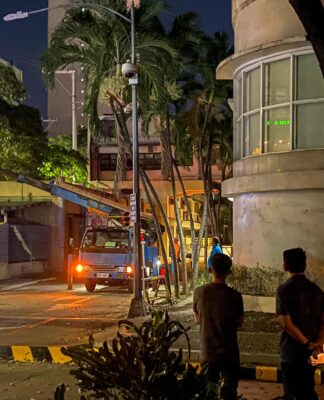 CONVICTED for the second time.
CONVICTED for the second time.
The plea of innocence by Arnulfo Aparri Jr., one of the primary suspects in the killing of Mark Welson Chua, the cadet who exposed corruption in the Reserved Officers Training Corps (ROTC) in 2001, has been denied by the Court of Appeals.
The court’s September 28 ruling upheld the guilty verdict on Aparri by the Manila Regional Trial Court Branch 18.
Aparri was sentenced to death by lethal injection but due to the abolition of the death penalty law in 2006, the sentence was reduced by the appeals court to life imprisonment without parole.
The three other accused, Paul Joseph Tan, Eduardo Tabrilla, and Michael Von Rainard Manangbao remain at large, but the court has issued warrants of arrest for them.
Chua, back then a second year Mechanical Engineering student, disclosed anomalies in the University’s ROTC unit that led to the relief of commandant Maj. Demy Tejares and his staff.
On March 18, 2001, members of the Mobile Division of the Manila Police District found the decomposing body of Chua wrapped in a carpet, floating on the Pasig River. Chua’s hands and feet were hogtied with shoelaces and his head was wrapped with packaging tape.
Medico-legal officers Dr. Valentin Bernales of the National Bureau of Investigation (NBI) and Dr. Romeo Salen of the Philippine National Police Crime Laboratory, who conducted the autopsy, found that Chua died of suffocation.
Chua’s death prompted the ROTC’s abolition and the establishment of the National Service Training Program focusing on community service.
The appeals court debunked Aparri’s claim that the lower court had erred in ruling that he was responsible for killing of Chua. “He insists that there was no evidence to prove that he performed any overt act that contributed to the death of Chua,” the ruling said.
But the 14-page decision penned by Associate Justice Juan Enriquez Jr. explained that the testimonies of the three prosecution witnesses who were all cadet officers, namely Franco Salvador Sueto, Eliseo Pitargue, and Emmanuel Rico Corpuz proved that Aparri and the three other accused were responsible for Chua’s death.
First, the witnesses saw Aparri dragging the body of Chua who was blindfolded and hogtied, with his head wrapped with packaging tape. Second, he assisted in covering Chua’s body with a carpet and taking it outside the Department of Military Science and Tactics (DMST) office. Third, he helped in loading Chua’s body at the back of a white pick-up car which was used to bring and throw Chua’s body into the river. Lastly, he was with the other accused when they left the DMST office on the night of March 15, 2001, aboard the same car.
Even if Aparri was not with the other accused when the body of Chua was thrown in the river, the court said that it did not make him less guilty. The appellate court also agreed with the Regional Trial Court that conspiracy was present.
“When conspiracy is established, the responsibility of the conspirators is collective, not individual, that renders all of them equally liable regardless of the extent of their respective participation, the act of one being deemed to be the act of all,” the ruling explained.
Aparri had also contended that his supposed participation in the crime was all based on his assumption that Chua was undergoing initiation rites for re-admission as a cadet officer.
“Appellant knows that initiation is illegal and anything that is similar to hazing is prohibited. It is not part of the training of a cadet officer to tie both hands and feet with shoelaces, to roll the body in a carpet, and much more to wrap a person’s head with a packaging tape,” the ruling said.
The court also affirmed the previous ruling that there was obvious premeditation and cruelty in the crime while taking advantage of night time.
Aparri’s claim that his voluntary surrender was a “mitigating circumstance” was disregarded. Records showed that Aparri surrendered to the NBI only after he learned that a warrant of arrest had been issued and that a case had been filed against him.
As stated in the court ruling, “Voluntary surrender cannot be appreciated in favor of an accused who surrenders only after a warrant of arrest is issued and he finds it futile to continue being a fugitive from justice.”
As of press time, Amet Chua, Mark Welson Chua’s mother was out of the country and could not be reached for comment.
In addition to life imprisonment, Aparri was “ordered to pay the heirs of Chua the amount of P50,000 as moral damages and P25,000 as exemplary damages in addition to the amount of P50,000 civil indemnity awarded by lower court.”
















